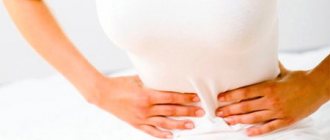If the unexpected happens and the baby has to be born at this time, doctors assure that he has a chance to survive. Immediately after delivery, the baby will be placed in a machine that provides artificial respiration. The fact is that the fetus’s lungs at this stage are not fully formed, and accordingly, he will not be able to breathe on his own. The same can be said about the digestive organs. Even if doctors manage to save the child’s life, he will not avoid major health problems in the future. Therefore, the mother needs to be careful and prevent his premature birth.
Baby movements at 22 weeks
Every day the child becomes more and more active. As mentioned above, with the rapid development of the central nervous system and the improvement of the brain, the fetus can make controlled movements: roll over, somersault, kick, tap on the wall of the placenta. And all this is fully felt by the expectant mother.
The child's movements cause indescribable delight in the mother and father. This also becomes reassuring for them, because fetal movements indicate good health.
Body changes and new sensations for women
The problem for some women in the second trimester may be excessive sweating - hyperhidrosis. The main causes of hyperhidrosis at week 22 are hormonal changes and an increase in the volume of fluid in the pregnant woman’s body due to increased uteroplacental blood flow. What should an expectant mother do to reduce sweat production and eliminate unpleasant odors? Choose bedding and clothing only from natural materials - synthetics are unacceptable for hyperhidrosis. Avoid coffee and spices - they can increase sweating because they have a stimulating effect on the central nervous system. Take a shower as often as possible, spend more time outdoors and be sure to ventilate the room in which you sleep. Read about the use of deodorants and antiperspirants during pregnancy below in our “Beauty and Accessories” section.
When to go to the maternity hospital?
- if your water starts to break;
- if you start BLEEDING;
- if you have CONTRACTS every 6-8 minutes.
Doctors and midwives of the Women's Health Resort Clinic are always ready for pregnant women registered for pregnancy in our Clinic, if it is impossible to contact them in person, to comment remotely (by phone, Internet) on an existing or newly emerging situation.
We are at your FULL DISPOSAL if you have any doubts or wishes.
Subsections
- Pregnancy management
- Cost of pregnancy counseling
- Screening during pregnancy
- Examination of pregnant women for congenital malformations of the fetus
- Comprehensive assessment of pregnancy markers
- Ultrasound of pregnancy
- Development of pregnancy by week
- Critical periods of embryonic development
- Possible problems during pregnancy
- Proper nutrition during pregnancy
- Hygiene for a pregnant woman
- Sleeping during pregnancy
- Risk factors (caution for pregnant women)
- Determining acceptable weight gain during pregnancy
- Determining your child's date of birth
- Assessment of fetal movement activity
- Sexual life during pregnancy
- Breathing and relaxation techniques during childbirth
- Literature for preparing for childbirth and raising children
- Premature birth, threatened miscarriage
- The first days after childbirth
- Program No. 7. Postpartum rehabilitation and VUM-building
- Program No. 16. How to remove belly fat
- Breastfeeding or bottle feeding?
- Breastfeeding: problems and rules
- Swaddling a baby
- Let's go to the maternity hospital! Things for mom and baby
- Measuring basal temperature and maintaining a graph
- Teeth and pregnancy
- Our mothers
- School of Natural Motherhood
- Questions and answers about pregnancy
- Reviews about pregnancy management in our Clinic
Lifestyle
At week 22, it is necessary to regularly unload the spine and strengthen the back with the help of special gymnastics for pregnant women. Here are some simple and safe exercises:
- Place one hand on your pubis, the other on your tailbone and gently move your pelvis back and forth for 2-3 minutes. Do the exercise several times a day.
- Get on all fours with emphasis on the palms of your hands and knees. Extend your right leg and make one circle with it, mentally counting to eight. Do the same exercise with your left leg.
- Sit on a fitball, straighten your back, put your hands on your hips, place your feet shoulder-width apart. Make circular movements with your pelvis on the ball - 5-6 “turns” in each direction.
If you feel unwell during exercise, immediately stop exercising, lie on your side and try to relax.
Beauty and accessories
Can I use deodorants and antiperspirants during pregnancy? Doctors recommend that women use natural deodorants - they do not contain alcohol, fragrances, aluminum salts or chemical additives, and therefore are absolutely harmless. Alum stone or alunite will also help get rid of unpleasant odors. This safe natural deodorant mineral blocks the activity of various microorganisms without leaving any traces on the body, while the sweat glands continue to work as before. As for antiperspirants, doctors do not allow treating areas of the skin with them during an “interesting situation” - they narrow the sweat ducts, thereby undermining the functioning of the kidneys and provoking the development of a variety of ailments and unpleasant sensations in pregnant women.
21,22,23,24 weeks of pregnancy: what happens, development of pregnancy and fetus
- home
- Services and prices
- Services and prices
- About Us
- Doctors
- Schedule and appointments
- Reviews
- Doctor training
- Clinic addresses
- Blog
- CIropedia
Week by week 21 - 24 weeks of pregnancy Elena Gevorkova Obstetrician-gynecologist, Moscow
21st week
BABY
The height of the fetus from head to toe this week is about 25 cm, and the weight is 300-400 g. At the 21st week of pregnancy, the baby is already very similar to a newborn baby, but somewhat thinner and with a larger head. Eyebrows and eyelashes are fully formed, and the fetus blinks frequently. His skin becomes flesh-colored, thickens, and constrictions appear on it due to the development of subcutaneous fat.
Intensive development of the muscles and skeleton of the fetus continues. The baby is active, and his small size allows him to perform many different movements - somersaults, turns around his axis, intense bending and extension of his arms and legs. During the day, the fetus can change its position in the uterus dozens of times: it lies upside down, downside down, or lies transversely in the uterus.
The fetus's hearing develops so well that it reacts not only to loud and sharp sounds, but also to conversations and music.
At this stage of pregnancy, intensive development of the fetal gastrointestinal tract continues. Receptors are formed on the taste buds of the tongue, and the baby clearly distinguishes the taste of amniotic fluid.
Future mom
The general well-being of pregnant women at this stage, as a rule, does not undergo significant changes compared to previous weeks. The movements of the fetus are felt more intensely, often the periods of sleep and wakefulness of the woman and the fetus do not coincide, and the mother may wake up at night, awakened by the baby. However, there are no painful sensations at this stage, since the fetus still has insufficient physical strength.
From the 21st week, a pronounced weight gain of the expectant mother begins due to the growth of the baby and the accumulation of muscle and fat mass. This is precisely what explains the increased appetite of a pregnant woman at this stage.
The development of the fetal skeleton requires an increase in calcium consumption. And if there is a deficiency of free calcium in the body of the expectant mother, then from this period problems with teeth are possible: their fragility increases, the teeth begin to crumble and collapse as a result of “washing out” of calcium from the dental tissue. It is extremely important to adhere to a balanced diet: consume dairy products - cheeses, cottage cheese, kefir. The calcium content is also quite high in fish, cereals, legumes - lentils, beans, as well as in vegetables such as broccoli. However, it must be remembered that calcium is best absorbed from vitamin complexes and medications. And it is quite possible that at this stage of pregnancy the doctor will prescribe the woman additional calcium intake, based on the condition of the pregnant woman and the test results.
Week 22
BABY
The baby's height is 28-30 cm, and by the end of the 22nd week he will weigh about 500 g. The proportional ratio of the size of the head relative to the body continues to change. The advance of the head is no longer so significant, and the length of the limbs is no longer so far behind the body: all these changes bring the baby’s appearance closer to its usual appearance. From this stage of pregnancy, the fetus begins to periodically straighten its legs, which previously were mainly in a bent state. Characteristic of this period is intensive improvement of the central nervous system. In the period from the 21st to the 25th week of intrauterine development, the weight of the brain increases from 20 to 100 g - this is a very intensive increase in mass.
The fetus makes small movements more and more clearly - moves its fingers, moves its head in different directions. If earlier for his favorite activity - thumb sucking - the baby raised his hand, feeling his face, then from 22-23 weeks he begins to tilt his head, as if getting his thumb into his mouth. This “towards” movement reflects quite serious processes occurring in the central nervous system. This is evidence of perfect sensitivity and coordination, i.e. a state when the fetus clearly senses the position of its body in space.
Amazing fact: by 22 weeks, the brain contains a full set of brain cells - neurons. This is exactly the amount of them that will be in the baby’s brain after birth and throughout life. The rest of the time there will only be an increase in connections between these cells and an improvement in brain function.
Future mom
The height of the uterine fundus by this time reaches 2 cm above the navel. The volume of the abdomen is not yet too large, but, nevertheless, the internal organs react to the rapid growth of the uterus, under the influence of which a forced change in their usual location occurs. So, at this stage, expectant mothers often feel discomfort in the area of the lower ribs, which move slightly apart under the pressure of the fundus of the uterus. To get rid of this, you need to monitor your posture and keep your back straight. Changing body position, bending, turning the body and other simple exercises will help relieve pressure on the ribs and relieve discomfort.
If the fundus of the uterus puts pressure on the stomach, then pregnant women feel heaviness after eating and heartburn. A change in the position of the stomach to a more horizontal one, as well as hormonal levels (high levels of progesterone) relax the muscle that closes the transition from the esophagus to the stomach - the sphincter. The contents of the stomach - food soaked in acid - are thrown back into the esophagus. Normally, this does not happen and the sphincter must close completely after food passes into the esophagus. During reverse reflux, the esophageal mucosa reacts to the acidic contents and pregnant women feel a burning sensation and an unpleasant taste in the mouth - heartburn. To prevent these phenomena, it is necessary to chew food thoroughly, eat in small portions, and not lie down immediately after eating, allowing the food bolus to move freely from the stomach without lingering in it. If these symptoms cause discomfort in a pregnant woman, you should inform your doctor. A rational diet and medications will help get rid of this problem.
Week 23
BABY
Fetal development at this stage is characterized by intensive formation of the respiratory system. From this stage, the fetus begins to make constant breathing movements. Before this period, they occurred sporadically and did not last long, but now respiratory movements continue for up to 40 minutes. Their frequency is 50-60 per minute. This systematic lung training will continue until childbirth. With each movement simulating inhalation, a certain amount of amniotic fluid enters the respiratory tract up to the closed glottis and is pushed out, washing the epithelium - the covering cells of the respiratory tract.
The fetus continues to swallow amniotic fluid, the liquid part of which is absorbed into its bloodstream, and the remaining part forms meconium - original feces. Sometimes intensive ingestion of water by the fetus causes irritation of the diaphragm - the flat muscle that separates the chest and abdominal cavities - and its subsequent contractions. This manifests itself in the form of rhythmic movements - “fetal hiccups”. This phenomenon occurs often and is not a sign of trouble. As a rule, “hiccups” last for several minutes and do not cause any discomfort to either mother or baby. If it occurs frequently and lasts several hours, you should inform your doctor about it to rule out other causes of hiccups, such as fetal hypoxia.
An important event of the 23rd week is the improvement of the hematopoietic organs and immune system - liver, spleen, bone marrow, lymph nodes and thymus. The thymus, or thymus gland, is the most important endocrine gland located behind the sternum. It grows intensively during intrauterine development and with the onset of puberty it atrophies - it decreases in size and stops functioning. The thymus can be called the “school of lymphocytes.” “Untrained” lymphocytes enter the thymus tissue, undergo maturation in it and exit into the blood as adult T-cells - strong lymphocytes that can resist foreign agents.
The baby’s own immune system during intrauterine development is only in the formative stage and is not able to independently protect the fetus. The main role of protection is performed by mother cells - antibodies. From the 23rd week, the baby’s immune system begins to “train.” The baby’s body learns to recognize antigens - foreign cells (bacteria, viruses, etc.), remembers them and forms a defense.
Future mom
At the 23rd week, the height of the uterine fundus reaches 4 cm above the navel. The volume of the uterus increases not so much due to the fetus, but due to amniotic fluid and the mass of the placenta. The weight gain during this period is about 5-7 kg. It is important to continue to monitor your diet to prevent excessive weight gain.
Due to the intensive growth of the uterus, the center of gravity shifts, the spine and joints may react with sensations of discomfort: aching pain occurs when walking, sitting, etc. This may require the appointment of wearing special support underwear or a bandage.
Week 24
BABY
The weight of the fetus at this stage is about 33 cm, and its weight is 600 g. The baby occupies the entire space of the uterine cavity, its movements become more distinct and less intense. The fetus is able to radically change its position from the head to the pelvic and vice versa, but gives preference to smaller movements - plays with the umbilical cord, bends and straightens the limbs. During this period, the number of muscle fibers increases sharply and reaches a maximum. Further, the increase in muscle mass will occur due to an increase in each muscle fiber in volume.
This period is characterized by the improvement of the fetal senses. Skin, vestibular, taste, and auditory sensitivity have become more complex over the past weeks and by the end of the 24th week they reach a fairly high level of development. The intensive development of the brain and the formation of connections with the senses determine the complex behavior of the fetus. The baby not only reacts to external stimuli - sounds, bright light, mood and well-being of the mother, but also forms certain behavior depending on external signals. So, if bright sunlight falls on a pregnant woman’s belly, the fetus turns away, squints its eyes, and covers itself with its arms. To loud and sharp sounds or situations when the mother experiences excitement, fear, anxiety, the baby either reacts with intense movements or, on the contrary, freezes.
Future mom
Weight gain during this period is approximately 500 g per week. The volume of the abdomen increases not only due to the growth of the uterus, but also due to its stretching. This may be accompanied by some pain. They should not be pronounced and last a long time.
Quite rapid weight gain may be accompanied by the appearance of edema, which at this time occurs due to compression of large veins by the growing uterus and difficulty in the outflow of lymph. Most often this is manifested by swelling of the feet, which intensifies in the evening. It is important to maintain a rest regime, try to rest your legs, and, if possible, elevate them to improve the outflow of venous blood. It is necessary to take care of comfortable shoes: this is an extremely important condition for the comfort of your feet. Using special compression garments - stockings or tights - will help reduce the appearance of swelling and prevent the development of varicose veins.
Wearing compression hosiery and selecting the degree of compression is recommended by a gynecologist or phlebologist.









